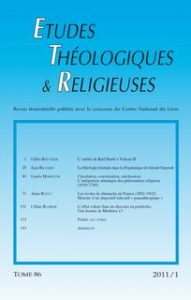Ce commentaire de Jean Richard entend relever quelques points saillants et innovateurs de la théologie trinitaire de Gérard Siegwalt : l’idée des trois manières d’être (transcendante, immanente, présente) de Dieu ; le point de départ avec l’Esprit Saint, dans l’actualité de la présence divine ; l’insistance sur l’universalité de l’œuvre créatrice-rédemptrice de Dieu, plutôt que sur la particularité de l’histoire du salut. La discussion porte alors sur certaines questions qui demeurent irrésolues : quel rapport de priorité voit-on entre la trinité « immanente » et la trinité « économique », entre la christologie d’en bas (christologie de l’alliance) et la christologie d’en haut (christologie de l’incarnation) ? Finalement, en théologie trinitaire, doit-on nécessairement choisir entre l’approche (« libérale ») d’en bas et celle (« orthodoxe ») d’en haut, ou doit-on viser une synthèse (ou dépassement) des deux, comme le fait Siegwalt ?
In his essay, Jean Richard discusses three salient and innovative features of Gérard Siegwalt’s Trinitarian theology: the idea of the three ways of being of God (transcendent, immanent, present); the start with the Holy Spirit in the actuality of the divine presence; the emphasis on the universality of the creative-redemptive work of God, rather than the particularity of Salvation History. The essay also highlights some unsettled questions: is there a relationship of priority between « immanent » and « economic » trinity, between a Christology from below (Christology of the alliance) and a Christology from above (Christology of the incarnation). Finally, do we need to make a choice, in Trinitarian theology, between the (liberal) approach from below and the (orthodox) approach from above, or should we aim at synthesising (or overcoming) the two, as Siegwalt does ?
p. 25-47
Auteur
RICHARD Jean
Jean RICHARD est professeur émérite de la Faculté de théologie et de sciences religieuses de l’Université Laval (Québec).
